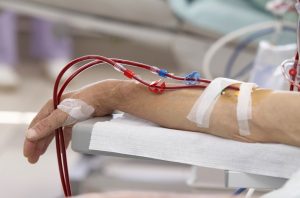 Diabetic nephropathy (diabetic kidney disease) is a type of kidney disease which is common among diabetics, especially those who do not have their diabetes under control. In diabetic neuropathy, the kidneys are unable to filter waste from the blood. Over time, this causes damage to the blood vessels, which may ultimately contribute to kidney failure, requiring a kidney transplant.
Diabetic nephropathy (diabetic kidney disease) is a type of kidney disease which is common among diabetics, especially those who do not have their diabetes under control. In diabetic neuropathy, the kidneys are unable to filter waste from the blood. Over time, this causes damage to the blood vessels, which may ultimately contribute to kidney failure, requiring a kidney transplant.
Monitoring kidney function among diabetics is important for reduction of their diabetic nephropathy risk and kidney failure prevention.
Causes and symptoms of diabetic nephropathy
Advertisement
When we digest protein, waste is produced, which needs to be filtered. The kidneys contain many tiny blood vessels that carry blood from all over the body for filtering. Waste is also carried to the kidneys to be expelled through urine.
Having diabetes and uncontrolled blood sugar can impair the process of waste removal because high blood sugar can cause damage to the arteries carrying the blood. Furthermore, it causes the kidneys to filter through too much blood, causing them to overwork.
After several years of overworking, permanent damage can occur, severely reduced the kidneys’ ability to filter blood. Waste products start accumulating in the bloodstream. The kidney damage leads to end stage renal disease, which requires a kidney transplant and dialysis, as the kidneys are no longer able to filter the blood.
Symptoms of diabetic nephropathy include:
- Constant fatigue
- General ill feeling
- Headache
- Nausea
- Poor appetite
- Swelling of the legs
- Itchy skin
- Easily developed infections
Because kidney damage takes years to develop, you may not experience symptoms until the disease has progressed. This is why it’s important to monitor your kidneys if you have diabetes to prevent diabetic nephropathy or detect it early on before a kidney transplant is required.
Treatment options for diabetic nephropathy
Advertisement
If diabetic nephropathy is discovered early on, treatment can be given to slow down disease progression. Once larger amounts of protein are present in the urine, severe damage is already done.
Some lifestyle tips that can help prevent kidney damage include controlling your blood pressure, controlling your blood sugar levels, eating healthy foods, exercising regularly, taking medications as prescribed, and avoiding NSAID pain relievers.
If diabetic nephropathy progresses, then dialysis will be required to filter the patient’s blood and, ultimately, a kidney transplant if kidney failure occurs.
